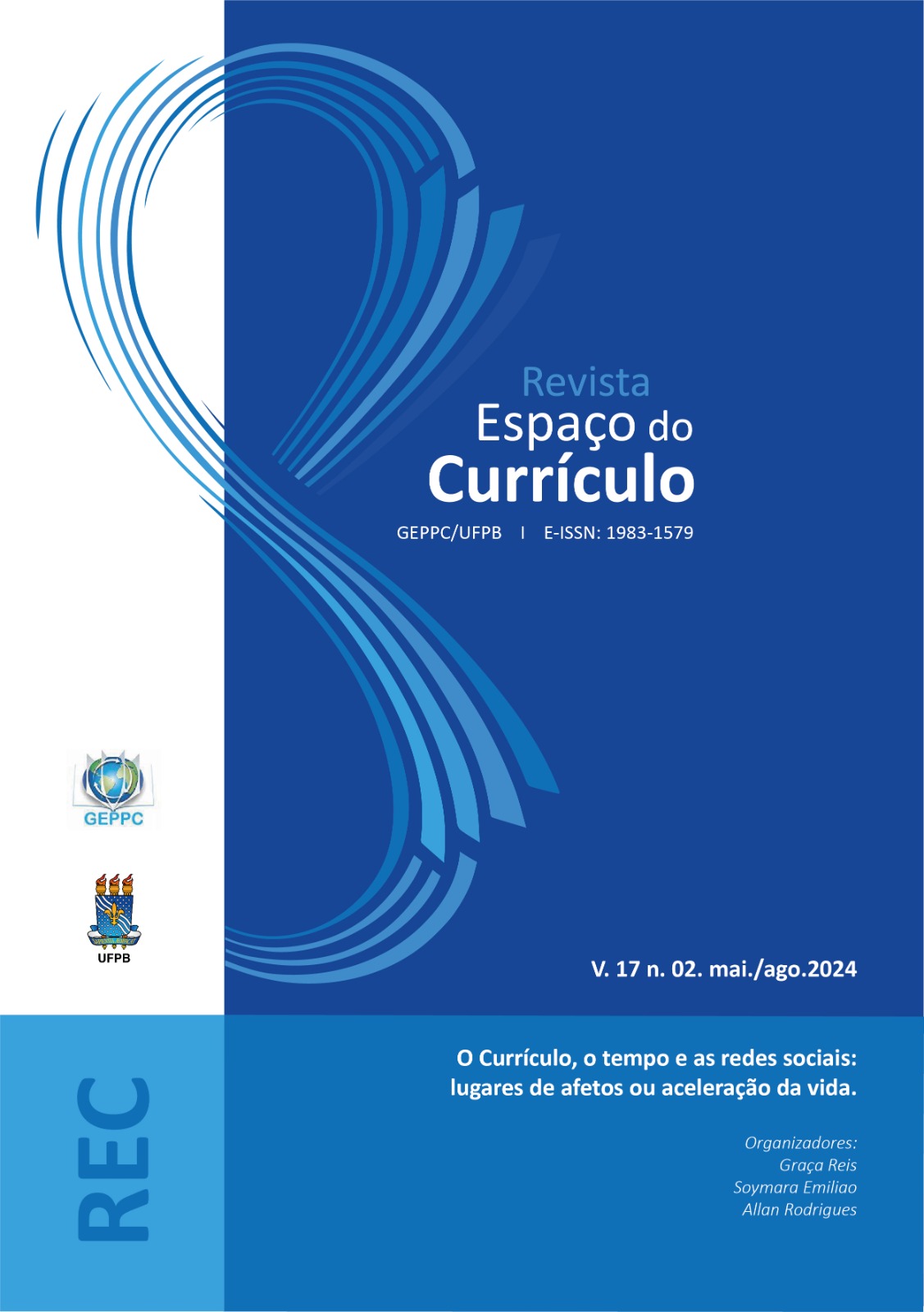ACCELERATED TEMPORALITIES IN NEOLIBERALISM
a look at contemporary school
DOI:
https://doi.org/10.15687/rec.v17i2.70375Keywords:
Time, Acceleration, Neoliberalism, SchoolAbstract
This theoretical essay aims to discuss how the temporalities of different accelerations can contribute to thinking about the space and curricula of contemporary schools. To achieve this, the work was divided into three parts. In the first, the concept of acceleration and its effects on the subjective dimension were presented using arguments arising from the field of Psychology. In the second, acceleration was investigated and how it has figured in the temporalities characteristic of contemporary times. In the third, an analytical distinction was drawn between the modern school and the contemporary school in order to verify the effects of temporalities on school curricula. From these analyses, it was concluded that the temporal experience of acceleration is produced by neoliberalism and has effects on the processes of subjectivation through temporal government. It was verified the existence of multiple temporalities, accelerated and decelerated, which are driven by the competition typical of neoliberalism and coexist in the social world and in our subjectivity. In relation to contemporary schools, it was noticed that their curricula have been constituted by accelerated temporalities that have synchronized and desynchronized forms. Finally, the thesis was demonstrated that both the norm of conduct and the neoliberal subjectivation model can be understood from a temporal perspective that produces effects in contemporary schools.
Downloads
Metrics
No metrics found.
References
CARBONELL, Eliseu. Debates acerca de la antropologia del tiempo. Barcelona: Edicións Universitat Barcelona, 2004.
CRISTIANO, Javier Luis. Tiempo-regla, tiempo-recurso y tiempo-sentido: aspectos de la estructuración del tiempo social. Athenea Digital, Bellaterra, v. 18, n. 3, p. 1-19, 2018. DOI: https://doi.org/10.5565/rev/athenea.2134. DOI: https://doi.org/10.5565/rev/athenea.2134
DARDOT, Pierre; LAVAL, Christian. A nova razão do mundo: ensaio sobre a sociedade neoliberal. 1. ed. São Paulo: Boitempo, 2016.
FERREIRA, Sabrina Mendonça; EMILIÃO, Soymara Vieira. “Não é um ano perdido”: resistência de professoras, temporalidades e invenções em cotidianos escolares pandêmicos. Revista Teias, Rio de Janeiro, v. 23, n. 70, p. 403-412, jul./set. 2022. DOI: https://doi.org/10.12957/teias.2022.60458. DOI: https://doi.org/10.12957/teias.2022.60458
FOUCAULT, Michel. Vigiar e punir: nascimento da prisão. 20. ed. Petrópolis: Vozes, 1999.
FRANCH, Mónica; SOUZA, Joseline Pequeno de. Clocks, calendars and cell phones: an ethnography on time in a high school. Vibrant: Virtual Brazilian Anthropology, Brasília, DF, v. 12, n. 2, p. 417-450, 2015. DOI: 10.1590/1809-43412015v12n2p417. DOI: https://doi.org/10.1590/1809-43412015v12n2p417
GROS, Frédéric. Desobedecer. Tradução de Célia Euvaldo. São Paulo: Ubu, 2018.
GUSMÃO, Luka de Carvalho; JESUS, Alan Willian de; MARQUES, Luciana Pacheco. Caleidoscópio do ser e dos tempos no currículo: quando as diferenças transbordam no cotidiano escolar. Revista Espaço do Currículo, João Pessoa, v. 13, n. especial, p. 711-725, dez. 2020. DOI: 10.22478/ufpb.1983-1579.2020v13nEspecial.54741. DOI: https://doi.org/10.22478/ufpb.1983-1579.2020v13nEspecial.54741
HASSAN, Robert. Empires of speed: time and the acceleration of politics and society. Leiden: Brill, 2009. DOI: https://doi.org/10.1163/ej.9789004175907.i-254
HERNÁNDEZ ZAPATA, Edwin Alexander; BEDOYA HERNÁNDEZ, Mauricio Hernando. Tiempo y gubernamentalidad: aproximaciones al gobierno del tiempo en el neoliberalismo. Qualitative Report, Fort Lauderdale, v. 27, n. 10, p. 2313-2336, 1 out. 2022. DOI: 10.46743/2160-3715/2022.5472. DOI: https://doi.org/10.46743/2160-3715/2022.5472
LAVAL, Christian. A escola não é uma empresa: o neoliberalismo em ataque ao ensino público. 1. ed. São Paulo: Boitempo, 2019.
LEMOS, Tayara Talita; QUINALHA, Renan. O neoliberalismo do tempo presente e a urgência de uma justiça de transição pós-neoliberal. Projeto História, São Paulo, v. 77, p. 157-180, maio/ago. 2023. DOI: 10.23925/2176-2767.2023v77p157-180. DOI: https://doi.org/10.23925/2176-2767.2023v77p157-180
MAIA, Ari Fernando. Aceleração e educação: reflexões pontuais sobre a temporalidade na escola. Revista Eletrônica de Educação, São Carlos, v. 11, n. 2, p. 368-383, 21 ago. 2017. DOI: 10.14244/198271992149. DOI: https://doi.org/10.14244/198271992149
PARAÍSO, Marlucy Alves. Metodologias de pesquisas pós-críticas em educação e currículo: trajetórias, pressupostos, procedimentos e estratégias analíticas. In: PARAÍSO, Marlucy Alves; MEYER, Dagmar Estermann (org.). Metodologias de pesquisas pós-críticas em educação. Belo Horizonte: Mazza Edições, 2012. p. 23-46.
ROSA, Harmut. Alineación y aceleración: hacia una teoría crítica de la temporalidad en la modernidad tardía. 1. ed. Buenos Aires: Katz Editores, 2016. DOI: https://doi.org/10.2307/j.ctvndv5zf
SAFATLE, Vladimir; SILVA JUNIOR, Nelson da; DUNKER, Christian (org.). Neoliberalismo como gestão do sofrimento psíquico. Belo Horizonte: Autêntica, 2021.
SARAIVA, Karla; VEIGA-NETO, Alfredo. Modernidade líquida, capitalismo cognitivo e educação contemporânea. Educação & Realidade, Porto Alegre, v. 34, n. 2, p. 187-201, 2009.
SIBILIA, Paula. Redes ou paredes?: a escola em tempos de dispersão. Tradução de Vera Ribeiro. Rio de Janeiro: Contraponto, 2012.
SILVA, Tomaz Tadeu da. Documentos de identidade: uma introdução às teorias do currículo. 3. ed. Belo Horizonte: Autêntica, 2009.
SPAT, Vanessa da Silva Rocha de Quadros. O tempo no cotidiano da creche: desafios e possibilidades. 2019. 164f. Dissertação (Mestrado em Educação) – Universidade Federal do Rio Grande do Sul, Porto Alegre, 2019.
SUGARMAN, Jeff; THRIFT, Erin. Neoliberalism and the psychology of time. Journal of Humanistic Psychology, New York, v. 60, n. 6, p. 1-22, 1 nov. 2017. DOI: 10.1177/0022167817716686. DOI: https://doi.org/10.1177/0022167817716686
THOMPSON, Edward Palmer. Tiempo, disciplina de trabajo y capitalismo industrial. In: THOMPSON, Edward Palmer. Costumbres en común. Barcelona: Crítica, 2000. p. 395-452.
VALENCIA GARCÍA, Guadalupe. Aproximaciones a la pluralidad temporal. História Revista, Goiânia, v. 17, n. 1, 18 dez. 2012. DOI: 10.5216/hr.v17i1.21691. DOI: https://doi.org/10.5216/hr.v17i1.21691
VÁZQUEZ RECIO, Rosa. Reflexiones sobre el tiempo escolar. Revista Iberoamericana de Educación, Madrid, v. 42, n. 6, p. 1-11, 10 maio 2007. DOI: https://doi.org/10.35362/rie4262373. DOI: https://doi.org/10.35362/rie4262373
WITTGENSTEIN, Ludwig. Investigações filosóficas. Tradução de Marcos G. Montagnoli. 9. ed. Petrópolis: Vozes; Bragança Paulista: Editora Universitária São Francisco, 2014.
Downloads
Published
How to Cite
Issue
Section
License
Copyright (c) 2024 Curriculum Space Journal

This work is licensed under a Creative Commons Attribution 4.0 International License.
By submitting an article to Curriculum Space Journal (CSJ) and having it approved, the authors agree to assign, without remuneration, the following rights to Curriculum Space Journal: first publication rights and permission for CSJ to redistribute this article. article and its metadata to the indexing and reference services that its editors deem appropriate.
















